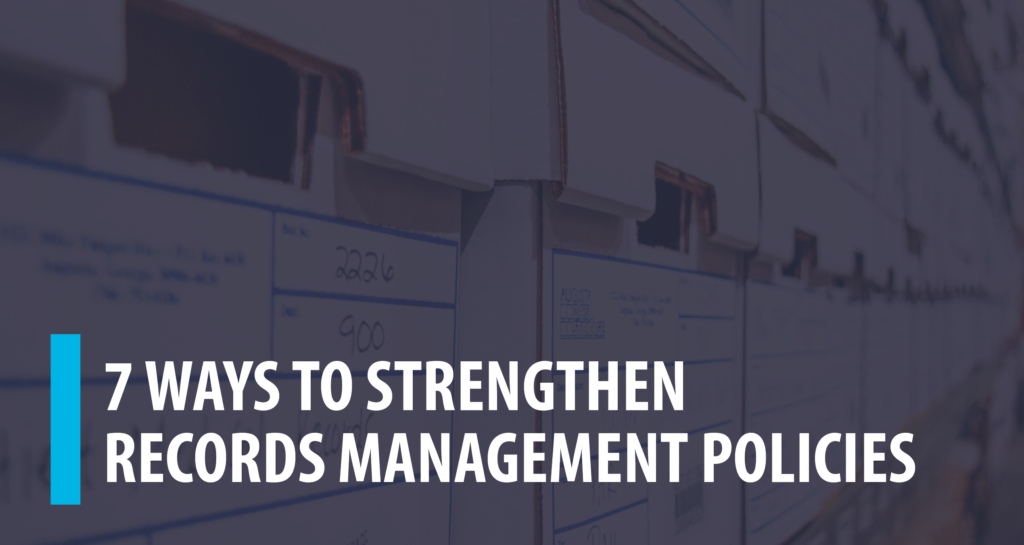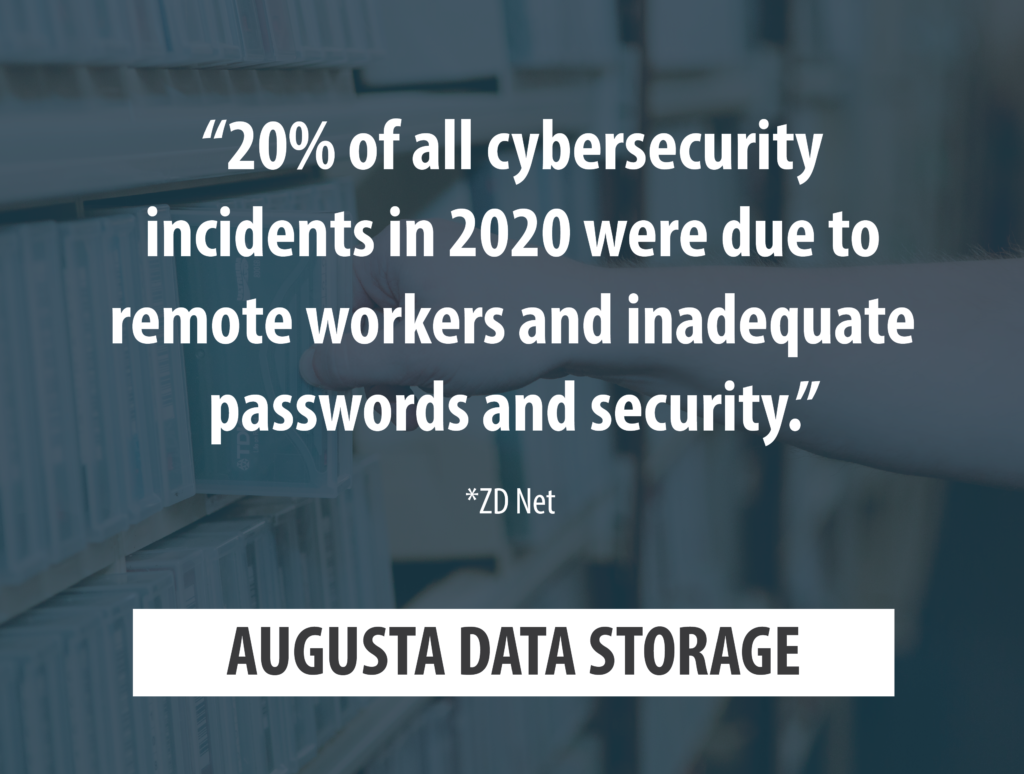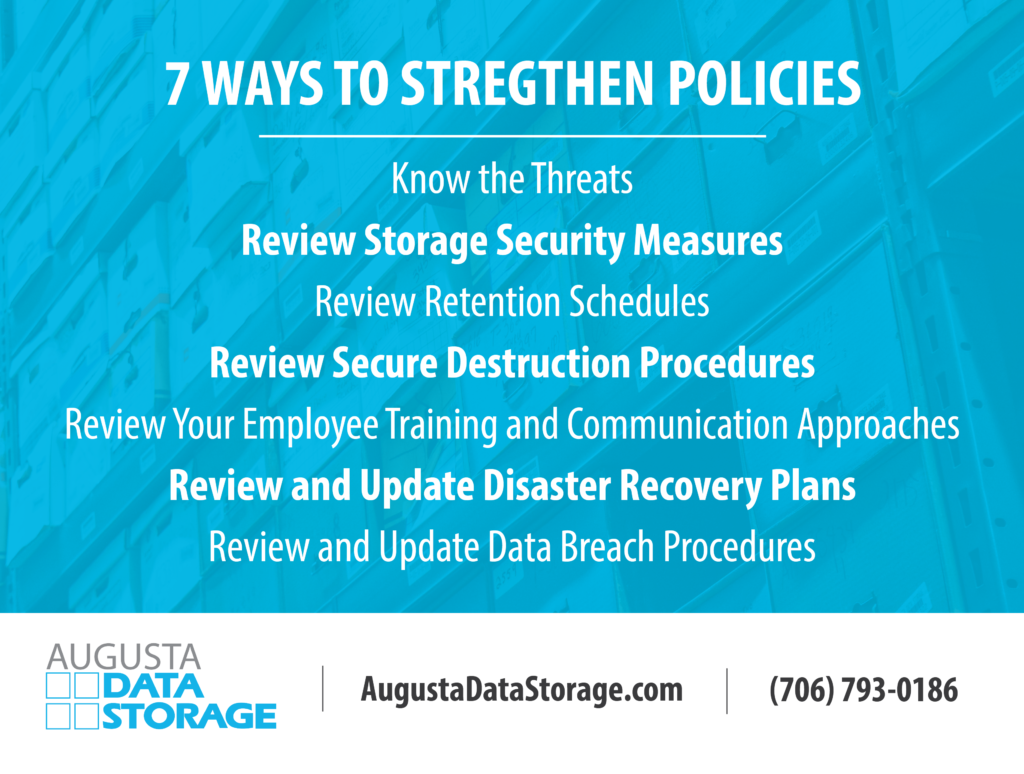7 Ways to Strengthen Your Records Management Policies This Year

As we say every year, January is the perfect time to review and update your records management policies and best practices. Each new year brings about new challenges and threats when it comes to records and information management, and your internal policies should be ever-evolving to reflect that.
According to ZD Net, 20% of all cybersecurity incidents in 2020 were due to remote workers and inadequate passwords and security. In 2019, there were 1,473 data breaches in the United States with over 164 million sensitive records exposed according to Statista.

As you head into a new year, consider setting aside time to review these 7 elements of your records management policy to ensure they are up to date with the latest information and regulations set out for your specific industry. And if you haven’t established your own policies, this loose framework can help you get started off on the right foot.
Know the Threats
One of the most important factors of developing a robust records management policy is ensuring you know the risks associated with the information your organization uses every day. It’s also important to know the rules and regulations for your industry to ensure that your internal policies are in line with the requirements set forth by the appropriate governing bodies.
Once you have reviewed the risk factors and identified new ones, develop a process for educating and informing your employees and staff about the risks and the steps they can take to ensure you maintain the integrity of the records and information you manage.
Review Storage Security Measures
Take a look at the security specifications set out in your company’s policies and procedures documents about the appropriate ways to use, store and destroy personal and proprietary information. Make sure the outlined security measures reflect risks as they exist in today’s information management landscape.
For Paper Records Storage
When keeping paper records in your office, it is especially important to monitor your record security policies. Limiting access, locking your storage space, and tracking chain of custody are 3 things to start with when establishing your records storage policies. If you are moving to a new office, here are some tips to simplify your file relocation. If your office is equipped to handle in-office storage, consider these when organizing your important documents.
If you are looking to move records storage off-site, Augusta Data Storage has secure warehouse space to store your physical paper records. We offer the most advanced security systems and storage technologies to prevent unauthorized access to your records. Our warehouse space is NARA compliant meeting specifications and requirements such as monitoring, restricted access and fire safety systems designed and approved by a fire safety engineer.
For Digital Records Storage
Storing digital records can be done in-office with the right regulations. Going from paper records to completely digital is a large task, but it can be done with these helpful tips. If you are wondering if going digital is right for your business, this can help.
Computer media and microfilm are protected in our climate-controlled vault storage. The temperature and humidity are monitored electronically 24/7, 365 days a year. Our climate-controlled media vault is great for storing items such as tapes, disks, reels, external hard drives, and more. Storing your electronic media with Augusta Data Storage ensures the protection and safety of your information.
Review Retention Schedules
Take time to review and update records retention schedules and adjust, as necessary, for changes in regulatory requirements for your industry. Now is also a great time to ensure that your records retention schedules are being met and that files are being purged and securely destroyed accordingly.
Review Secure Destruction Procedures
As we mentioned above, secure destruction is an important part of the records retention process. Once records become outdated or are no longer needed, your organization should have clear policies for how that information is handled and what constitutes appropriate destruction. Be sure to review the steps and update any language to reflect regulatory changes since your last policy update.
For Paper Records
Augusta Data Storage offers secure document shredding and disposal for all of your paper records and information. We offer many shredding solutions including on-site document shredding, off-site document shredding, and document destruction purging.
For Digital Records
For digital records and media, Augusta Data Storage offers many specialized destruction options. Secure destruction is a safe and secure way to ensure the data left on hard drives or other devices are inaccessible after destruction. E-cycling is an environmentally friendly option for document destruction.
NAID-AAA Certified
Augusta Data Storage holds a NAID-AAA Certification for mobile and plant-based records and hard drive destruction. Our organization has been certified by NAID (National Association for Information Destruction since 2009. This certification for plant-based and mobile destruction allows us to offer services compliant with government regulations such as HIPAA, FACTA, Sarbanes-Oxley Act, Gramm-Leach-Bliley Act (GLBA), and others.
Review Your Employee Training and Communication Approaches
Employee training and education is one of the key factors in the success of your records management programs. It’s important that your staff know and understand the importance of maintaining the integrity of your information, what steps to take if they suspect an accidental or intentional breach, and what common threats they should be aware of in their day to day work.
Now is a great time to review when and how you communicate with your employees about these procedures and how often you should send out updates and reminders on best practices and evolving risks.
Review and Update Disaster Recovery Plans
In the event of a fire, flood, hurricane, tornado or other natural disasters how will your business recover lost information? Your disaster recovery plan should outline not only how you will recover after the disaster occurs but the proactive steps you are taking to backup information and records to protect them before disaster strikes.
Review and Update Data Breach Procedures
The number of data breaches that occur each year continues to climb. It’s more important than ever to have data breach procedures in place. No one wants to think about how they will handle a situation like that, but having a clear plan helps you avoid fumbles and missteps on the road to recovery. A few things you’ll want to consider are:
- What employees should do if they suspect or uncover a breach?
- How will the company react? How will you notify impacted parties? How will you communicate with the public about a breach?
- What measures are you willing to take to recover the information?
- What legal and financial implications exist because of a breach?
- What do the long-term impacts of a breach look like for your business?
Knowing the storage security and secure destruction procedures for paper and digital records is key when managing your company’s records. Internally, make sure your employees are informed and updated on the importance of information maintenance and disaster recovery plans. On-going employee education and communication helps to keep records security top-of-mind.

If you are looking for a partner to help you manage storage, records security, and retention schedules, Augusta Data Storage is here to help. Secure, off-site storage is available in our records warehouse alone and our in-house specialized destruction services make managing your retention schedules and secure destruction processes easy.
Augusta Data Storage is the one-stop-shop you need to manage these 7 elements of your records management policy. Contact us today to get started.
